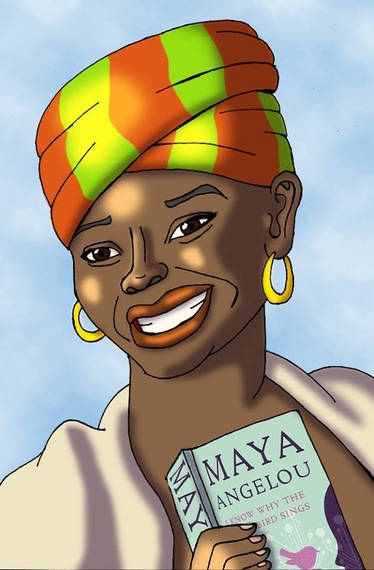
If you have the privilege of being born a black woman, it is my belief, that it is a part of your divine mission to liberate yourself from all external and internalized oppression and thereby liberate the world. Mother Maya Angelou and the words of other writers like her, provide the key to that liberation.
Art by Brandon S. Pilcher
As black women, we attend schools that teach us historical narratives about the "founding" of the "new world," the conquest and colonization of Africa and Asia, slavery in the Americas, the Jim Crow Era, the Civil Rights Movement and the Women's Movement.
In every narrative, someone who resembles a black woman either due to skin tone, genitals or both, is the conquered and not the conqueror, the beaten and not the beater, the violated and not the violator, the colonized and not the colonizer, the enslaved and not the slave master or slave mistress and the one who is demanding that power be conceded rather than the person possessing the power to concede. Stories of Black women's resistance such as the histories of Yaa Asantewaa, Queen Nzinga, Sojourner Truth and Shirley Chisholm are few and far between in U.S. public schools.
We then ask ourselves, how can we feel empowered when practically all of the common narratives about ourselves are about being disempowered? Sister Maya Angelou provided an answer:
"You may write me down in history
With your bitter, twisted lies,
You may trod me in the very dirt
But still, like dust, I'll rise
...
Out of the huts of history's shame
I rise
Up from a past that's rooted in pain
I rise
I'm a black ocean, leaping and wide
Welling and swelling I bear in the tide."
-- Maya Angelou, "Still I Rise"
In a society that judges a woman's worth based on her beauty, we wondered how we could feel beautiful when the white skin, blue eyes and long straight hair on the covers of most beauty magazines were so starkly different from the physical features that we possessed. Mother Maya Angelou provided an answer:
"It's the fire in my eyes,
And the flash of my teeth,
The swing in my waist,
And the joy in my feet.
I'm a woman
Phenomenally.
Phenomenal woman,
That's me."
-- Maya Angelou, "Phenomenal Woman"
Mother Maya Angelou's words and her very being are life-giving. In fifth grade, when I borrowed Dr. Maya Angelou's autobiography "I Know Why the Caged Bird Sings" from the local library and read how she had been raped as a little girl, I learned that harsh experiences do not have to define who we are or what we become. When I performed "Still I Rise" at my middle school I felt my own insecure adolescent spirit rising. A few years later when I performed "Phenomenal Woman" at my Quaker prep school I came to understand that I was phenomenal.
Mother Maya Angelou's life-giving words should repeat themselves in the minds of every woman, especially every black woman.
And with her words as the soundtrack to our lives, we should walk through the world with our beautiful kinky-haired heads held high while smiling with our thick lips and sashaying with our black girl hips. We can then, in the words of Ntozake Shange, come out, know ourselves, know our own voices and know our infinite beauty.
And in liberating ourselves, we liberate every other human being on God's green earth because black women, especially lesbian black women, have no vested interest in society's current power hierarchy. As we embrace our beauty, we become living and breathing monuments to the fact that there are no formulas for beauty. As we own our magnificence, we demonstrate the magnificence and equality of all human beings. Moreover, as we achieve feats heretofore unimagined, we bear witness to the fact that we all "still rise."
